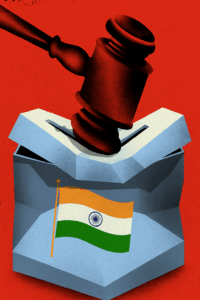


THE Supreme Court recently overruled the outcome of sarpanch polls in Haryana’s Panipat district village of Buana Lakhu. In a novelty, the top court called all the Electronic Voting Machines (EVMs) that were used in the poll to its New Delhi headquarters and had a recount.
This was the first time that the Supreme Court itself conducted a recount of EVM votes.
Challenging an Election Result
Election results can be challenged by filing an election petition.
- In the case of Parliamentary, Assembly, or State Council elections, the petition is to be filed with the High Court of the relevant state.
- In local government elections, such petitions are addressed to district-level civil courts.
Such a petition may be filed only by a candidate or an elector connected with the election, and it should be filed within 45 days from the date of the declaration of results. Notably, the petition must state all material facts that constitute the basis of the challenge. Where there are charges of “corrupt practices,” particulars such as the persons involved, dates, and locations should be furnished.
Grounds for Invalidating Results
Courts may nullify an election on a variety of grounds-
- Bribery or undue influence — e.g., a candidate keeping their criminal background secret or encouraging hatred among social classes.
- Disqualification — if the elected candidate was disqualified on the election date.
- Improper rejection of a nomination form.
- Breaches of constitutional or electoral laws — where such breaches have prejudicially affected the result.
When Can Courts Order a Recount?
Recounts are ordered by courts, but only in rare cases. Because the act of recounting entails the re-examination of ballots and can invade the secrecy of the vote, a recount is not easily granted.
A recount will be ordered only if a petitioner files specific and credible evidence creating a prima facie case showing that counting errors are likely to occur.
Normally, recounts are done where the election took place. The Panipat case was unusual since the Supreme Court did it at its headquarters and cited “peculiar facts and circumstances.” Overturning Election Results It is rare, but not unprecedented, for a court to hold an election invalid and pronounce another candidate elected. This can occur if the court determines that the petitioner or another candidate would have received a majority of valid votes.
Alternatively, a petitioner can establish that they would have won but for the corruptly obtained votes of the victor. Here, the onus of proof is great — tangible evidence must show how many votes were contaminated by corruption.
We strive to make a lasting impact on India’s policy and planning landscape through fair, unbiased, and incisive research based journalism.
But we can’t do it alone.
Together, we can create a better India, where policies are fair, planning is unbiased, and the truth prevails. Your contribution matters, and we shall be immensely grateful for your support.

